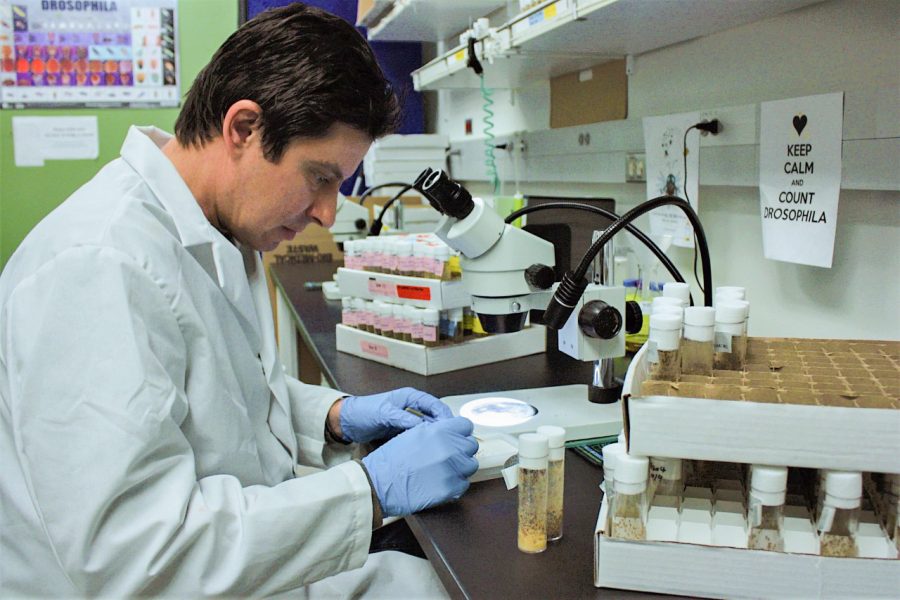Insulin can prevent mosquito-borne diseases
WSU, U of I researchers find way to minimize virus replication
Alan Goodman, assistant professor of molecular biosciences at WSU, examines fruit flies under a microscope.
November 21, 2019
At WSU’s Biotechnology and Life Sciences Building, Alan Goodman, assistant professor of molecular biosciences at WSU, and other researchers have discovered a biological pathway that shows how exposure to insulin in mosquitoes inhibits viral replication.
This discovery began with observing the pathway in fruit flies that were either more susceptible or more resistant to West Nile virus infection, Goodman said.
The researchers noticed that fruit flies – and later, Culex mosquitoes – that had been fed insulin were less susceptible to the virus in their systems compared to fruit flies that had not been fed insulin, according to the study. This was explained by the inhibition of one biological pathway and the stimulation of another.
The inhibited pathway Goodman highlights in the research paper prevents specific gene expression in the fly from occurring, according to the study. The stimulated pathway is responsible for sending signals from the cell’s surface to the DNA, which leads to the activation of the JAK/STAT pathway.
The JAK/STAT pathway prevents viruses from growing inside of the mosquito. Less susceptibility in the mosquito could mean less virus transmitted to people Goodman said.
Shirley Luckhart, professor of biological sciences at the University of Idaho, works in an Arthropod Containment Level 2 lab.
“For this project, we’re focused on the concept of delivering small synthetic molecules to mosquitoes that might tweak these pathways to block the pathogen infection,” Luckhart said.
Before researchers begin testing the efficacy of insulin administration to mosquitoes, Goodman said several crucial questions must be considered.
The mechanism needs to be observed in wild mosquitoes outside of the lab, the possible environmental hazards need to be identified and mitigated, and the mutation rate of the virus must be studied to ensure that treatment does not backfire, Goodman said. Additionally, feeding mosquitoes insulin could increase the feeding habits of mosquitoes.
One genus of mosquito that is particularly threatening is the Culex, which is one of the most prominent mosquitoes transmitting the West Nile Virus, Goodman said.
Another major genus responsible for the transmission of the West Nile virus, Zika, and Dengue is the Aedes mosquito, he said. This genus uses the JAK/STAT pathway when infected with West Nile virus, Dengue, and yellow fever, he said.
Over 390 million people are infected with viruses transmitted by Culex or Aedes mosquitoes annually, according to the World Health Organization. Unfortunately, vaccines currently do not exist for these viruses, Goodman said.
Researchers at WSU, UI, and other collaborating universities will test the bounds of this mechanism in future research.






















